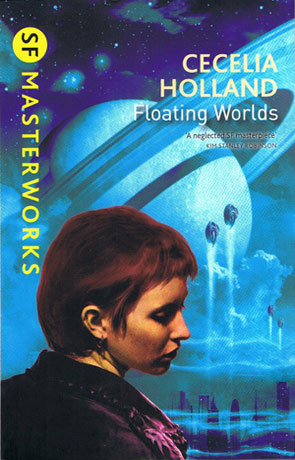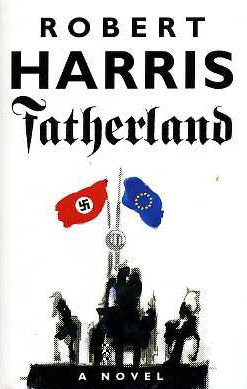I have been very unimpressed by many of the books I've been reading recently. I have given up on on five of them. Three were SF Masterworks:
'The subject common to graffiti the world over appeared again and again in blatant crudity and total lack of draftsmanship, but the finest example, drawn over all the rest and pristine in reproduction, graced the door of the corner flat. In brilliant, impertinent white a huge penis stretched most of the height of the door, balanced on a pair of gargantuan testicles.'
But then we move onto the story proper, which the scholar has reconstructed from historical records:
'"It is not an imagined fiction. It is researched. All the characters lived and left records on tape and in data banks. There are descriptions, even pictures and police recordings providing every detail."
...
The screen turned black and the first dull yellow letters appeared:
The Sea and Summer
A Historical Reconstruction
by
Lenna Williams'
And that's when it gets boring. One could argue that Turner deliberately made the main story boring because it's supposed to be a scholar's historical reconstruction, not an artist's fantasy, but I'm not giving him that. The characters narrate with almost identical voices, and they each narrate the same events. It's so slow. I gave up when a third character started narrating events which had already been described to me by two other characters.
I read in one review that The Sea and Summer may only have been included in the SF Masterworks because the collection is short on Australian authors. I think it's more likely that it was included because the story is, in some ways, eerily prescient:
After a global financial crisis, a lot of the population becomes unemployed and has to live off inadequate state benefits. Those living on benefits are demonised by the media and generally ignored by people still living comfortably, such as the Conway family.
But then Mr Conway is made redundant. He commits suicide because he knows he won't get another job. His wife and two sons, now living off benefits, move to a rougher area and start hanging around with other people living off benefits. Boring things happen. One of the sons is good at maths. The other goes to a fancy academy for clever people. The mother gets romantically involved with someone. I gave up after 154 pages.
The Sea and Summer, like Stand on Zanzibar (1968), presents a dystopian 21st century future which is not as engrossing or terrifying as our dystopian 21st century present.

2) Floating Worlds (1976) by Cecelia Holland is, apparently, a very influential space opera, 'a neglected SF masterpiece.' Set an unspecified time in the future, it opens with the protagonist wandering round the ruins of Manhattan as a tourist:
'From here she could see through the broken walls to the next row of ruins, and through them to the next, all huge, the biggest buildings she had ever seen. The people who had built this city had dominated earth for three centuries, by money, by force, and by guile; they had colonized Mars, reached as far as Uranus, cracked atoms and made whole cities out of polymer, and Manhattan had been the heart of that empire.
...
"Did they live here? In glass buildings?" Some fable moved elusively at the edge of her memory.
"No. They lived somewhere else and came in here during the day."
"Now tell me the truth."
"I'm sorry, kitch, that is the truth."
She stood looking up at the glass. Maybe in those days glass had been more common than it was now. Waves of stain crossed it, traces of dry dust like tracks from the time when the ruins had been under water.'
In this distant future, Earth is an anarchist state, Mars is consumerist, Luna (the Moon) is fascist, while the moons of Uranus and Saturn make up the Styth Empire. The Styths are a mutant race of humans who believe they should conquer everything.
The protagonist, Paula Mendoza, is hired by the Committee for the Revolution, a sort-of vestigial government which oversees the Earth's anarchy, to negotiate a truce with Styths, because she happens to speak their language. Paula doesn't really care about the job:
'She had already decided not to put anything on the walls since she was keeping the job only until she found other work... She felt herself being forced into a role. Her life was closing in on her. She hated the Committee job, even the Styth case bored her, but it paid well and she kept putting off quitting because she liked the money.'
Holland's prose is very terse: she uses a lot of short sentences. This makes everything feel like the tense build-up to some climactic revelation or catastrophe:
'Paula took the midnight train to New York. Walking up the aisle of the car, she saw Bunker sitting next to the window on a forward bench. After a moment she put her bag on a rack over his head and sat down opposite him He had a book plug in his ear; he ignored her. She stretched her legs out before her. The train was almost empty. The lights flashed on and off, and the bench under her jerked forward. She braced herself. The train bounded forward, stopped cold, and started up again. They rolled off into the dark.'
Paula and Bunker proceed to have a short, boring conversation, and then Paula goes home.
Fifty pages in, at the end of chapter one, Paula is summoned to Mars to chat with some Styth negotiators. Throughout chapter two she has boring conversations with people on Mars, and then decides to fuck one of the top Styths:
'He straightened up on his arms. She could scarcely breathe in the dense fragrance he was giving off. When she kissed him again, his skin was warm, almost feverish. They got up and undressed. His body was perfect. Dressed, he simply looked massive. His broad chest swelled into his back, the muscle and bone smoothly shaped down to his long waist. He had an erection. They lay down side by side on the couch. His skin warmed her. While she explored him with her hands and her mouth she tried to get used to his scent. All in silence they joined together. His eyes closed, as if he were doing it alone. She rubbed herself down on his thick stalk, her hand on his hip, intent on the swelling tension in her groin.'
Floating Worlds feels like a trashy soap opera... in space!
I gave up when the big reveal at the end of chapter two, 105 pages in, was OH NO! SHE'S PREGNANT WITH HIS BABY!
Not my thing.
At the start of chapter 2, one character (who is of course very cool) is in court, wondering whether she will be found guilty of anything and charged. The speculation concludes with:
'Fuck it, what difference did one more charge make, anyway? The fines would clean her out and then some, one more garnishment on her wages, so-fucking-what. All she cared about now was getting back on the street'
Later, she wonders what her BFF Mark is doing:
'But the best question was what the fuck was Mark doing there all on his own without a word to her. She and Mark were in it together, always had been. They'd been in it together in the beginning, and when Galen had bought most of the video-production company out from under the Beater, and they'd been in it together when Galen had let the monster conglomerate take EyeTraxx over from him, and they were supposed to be in it together the day after tomorrow, when they were due to show up for their first full day working for the monster conglomerate.'
Cadigan is so fucking cool that she italicises the word 'fuck'.
I gave up at page 36. Not my thing.
The other two disappointments were Fatherland (1992) by Robert Harris and Naked Lunch (1959) by William Burroughs.
 Fatherland came across as a cliché detective thriller with an alternate history gimmick: in 1960s Nazi Germany, loner cop Xavier March investigates a brutal murder, which leads him to discover a terrifying conspiracy going right up to the highest echelons of government..
Fatherland came across as a cliché detective thriller with an alternate history gimmick: in 1960s Nazi Germany, loner cop Xavier March investigates a brutal murder, which leads him to discover a terrifying conspiracy going right up to the highest echelons of government..I didn't reach the end, but I could see where it was going and couldn't be bothered sitting it out. I checked Wikipedia.
SPOILER ALERT.
March discovers that the Holocaust happened.
E.g.:
'The boy crumples to his knees with a long "OOOOOOOOH", shitting and pissing in terror. He feels the shit warm between his thighs. A great wave of hot blood swells his lips and throat. His body contracts into a foetal position and sperm spurts hot into his face. The Mugwump dips hot perfumed water from alabaster bowl, pensively washes the boy's ass and cock, drying him with a soft blue towel. A warm wind play over the boy's body and the hairs flat free. The Mugwump put a hand under the boy's chest and pulls him to his feet. Holding him by both pinioned elbows, propels him up the steps and under the noose. He stands in front of the boy holding the noose in both hands.'
Or:
"Darling, I want to rim you," she whispers.
"No. Not now."
"Please, I want to."
"Well, all right. I'll go wash my ass."
"No, I'll wash it."
"Aw shucks now, it ain't dirty."
"Yes it is. Come on now, Johnny boy."
She leads him into the bathroom. "All right, get down." He gets down on his knees and leans forward, with his chin on the bath mat. "Allah," he says. He lookd back and grins at her. She washes his ass with soap and hot water sticking her finger up it.
"Does that hurt?"
"Noooooooooooooo."
Not my thing.
Hopefully the books that I'm currently reading won't be so disappointing: Orlando (1928) by Virginia Woolf, Arguably (2011) by Christoper Hitchens, Bridget Jones' Diary (1996) by Helen Fielding, and The Scar (2002) by China Mieville. So far, I am enjoying them all.

